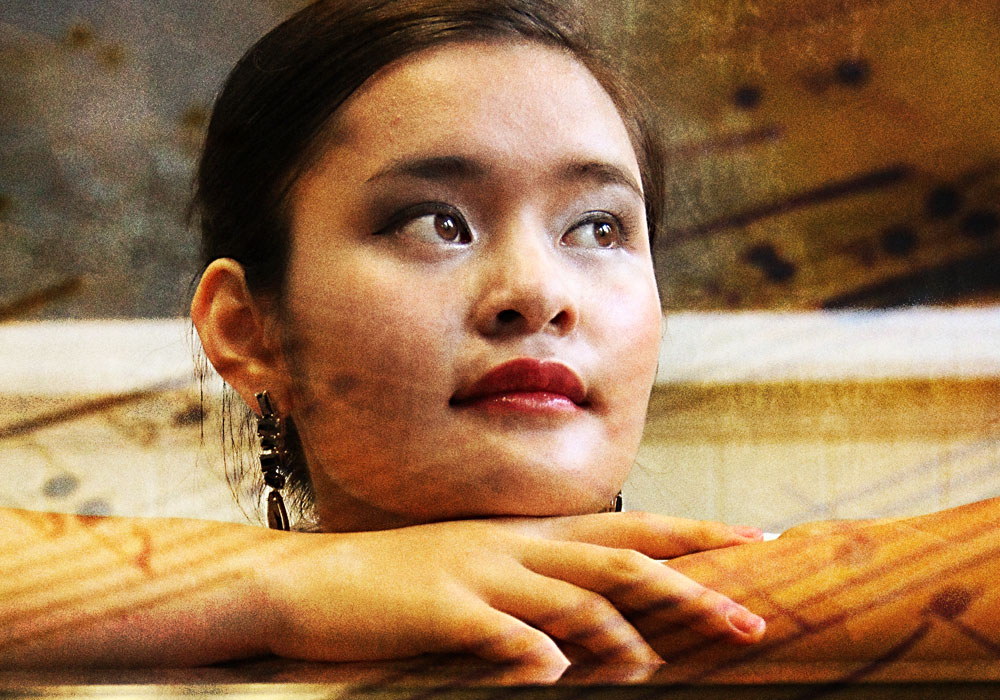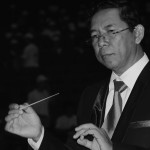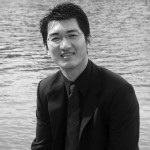It’s called ‘classical music’. It’s called ‘art music’. Snobbishly, it’s sometimes called ‘serious music’. It’s hard to define, but we know it when we hear it. It’s piano sonatas and chamber music and string sections and choirs and conductors with flying batons and hair in disarray. And since 2004, the International Music Festival Phnom Penh (IMFPP) has been growing and encouraging its development in Cambodia. Over the weekend of November 7 – 11, Artplus Foundation is presenting the 10th IMFPP at the InterContinental Phnom Penh and Meta House, featuring all of the above and more.
Anton Isselhardt, director of the festival, is quick to point out that this is not just an event for expatriates longing for the concert halls of home. “Who is our audience? Every motodop; every cyclo driver, even the prime minister and the king: we want them all!” While financial backing for the festival is almost exclusively provided by the Goethe Institute, the European Union and the German Embassy (with performance space provided by the venue), Anton is clear: “We Western people… don’t do this initiative for ourselves. It is every year a challenge, especially to promote it to the Cambodian community.” The effort is paying off in the numbers: attendance has increased from the early days of very low local attendance to be solidly 50% Cambodian over the last two years.
The title of this year’s festival is Journey; the theme is the development of music through the tumultuous changes of the 20th century, dominated by two major wars, astonishing artistic, political and social change, and shifts in the global cultural centre of gravity. The formal music world was being augmented by outside influences, from the revolutions in visual arts to the incorporation of traditional melodies and jazz.
With such an ocean of musical adventurism to choose from, the programme focuses on the first half of the century, particularly the convulsions of European music: reaching from the neo-classical Czech composer Bohuslav Martinu, through the impressionism of Maurice Ravel to culminate in the vigorous folkloric injections of Bela Bartok. “That’s why we call it Journey, it is a trip to the Old World,” says Anton.
European music, however, is also where we find the origins of the 20th century American innovation of the Broadway musical, a form that is celebrated by the Friday night concert by the Bella Voce choir, formed in Phnom Penh in 2000
Acknowledging Broadway’s debt to Europe, the programme features works by the German Kurt Weill (selections from The Threepenny Opera) and two Americans who drew heavily on their ancestral roots: George Gershwin (including selections from Porgy and Bess) and Leonard Bernstein (including selections from West Side Story).
“We consider more or less everything and that’s the key idea of the festival: to show as much as possible. France was very dominant in those days and it would be easy to do it all with French composers, but no, we want to try to mix it so we have Austria, Belgium, Czech, Estonia, England, France, Germany, Hungary, Italy, Poland, Romania, Russia and Spain. And Cambodia.”
Undoubtedly, the highlights of the festival are Cambodian. In particular where, as Anton says, Cambodian musicians are playing Cambodian music for Cambodian people. For this we move forward in time to the later 20th century, with works scattered through the programme by Cambodian composers working in the Western traditions, dominated by Norodom Sihanouk, of course, but also rising teenage star Bosba Panh and more established names Chinary Ung and Him Sophy. “It is very much in our focus to bring… Cambodian music and Cambodian musicians into the festival,” says Anton.
In the piano summit on the Sunday, Cambodian musicians Rong Sereyvann and So Sronos will be participating, alongside world-renowned pianists from France and Germany. The Angkor Young Orchestra will play a selection of the late King Father’s works in the Grand Finale on the Monday evening. On the same night, the Phnom Penh String Orchestra welcomes guest musicians from Europe and a group of four students from the Sen Hong Music Centre in Ho Chi Minh City.
As part of the effort to encourage broader participation, the festival includes pre-concert introductory talks for two of the concerts. “This is a part of the concert we offer to you, our audience,” Anton explains. “Come here and get a little bit of information about what’s going on here, from Professor Dieter Mack and Professor Him Sophy. Him Sophy will talk about his own work. Both lecturers are experienced people. It does not mean those who don’t join that pre-concert introduction will have less appreciation, but what can we do more than to offer?”
While these introductory talks will provide some context, accessibility is not the main focus of the festival and a fine balance is sought between the extremes of crowd pleasing and crowd punishing. “In 20th century music, people might be suffering on their chairs so we don’t do programmes like that. This point we learn, we develop, we improve, finding somehow the right pieces. Even as an artist I hate it, to ignore the audience, but it does not mean we say, hey, what does the audience like? If that’s classical music then you play Mozart and Haydn and don’t play anything else.”
Making the festival accessible in more physical and social ways, however, is an ongoing effort. “8 o’clock in the evening is not good for Cambodians, 7 o’clock is just fine, but then there is the traffic, the rush hour.” And the issue of ticket prices (actually, the absence of pricing: all events are free) is an ongoing debate. “This is a long, useful discussion: if it makes sense to give such things free to people. It might be that if it is free, it has no value.”
And then there are the little things: making a brochure of a size that slips into a pocket rather than sitting at home; including a festival bonus that gives audience members who attend all sessions a chance to win a three-day package tour to Kampot/Bokor; and ongoing assessment of the extent of the reach into the audience.
A major challenge for any festival is the difficulty of booking well in advance, and in Cambodia this is even keener, particularly when juggling the financial inputs. “To discuss the next year’s programme, to already knock on the door of some artists, [asking] are you free, this is the project idea, but the confirmation, it’s coming next year, in April or May.” Anton is, however, undaunted: “On the other hand, if I would wait until the bucks are in the account, there will never, ever be a music festival, so this is something really challenging and adventurous. I have to be careful not to be too ambitious in doing programmes. I’m a musician myself and if I deal with musicians, I’m not a project manager or a concert agency, I’m a colleague. And it always hurts me to negotiate with my colleagues, to say: hey guys, it’s not more than that. If you want to make money, stay in Kuala Lumpur or stay in Germany.”
Clearly relishing his labour of love, Anton animates dramatically when he talks of his own role. “Last year I played [flute] some, this year it’s only conducting, in the final concert, so a weekly rehearsal with the Cambodians. I mean, Cambodians who play Bartok. Can you imagine that? They are on another star. They are on Jupiter already. So different from their local music traditions. To be aggressive in music? Yes! Sometimes they cannot believe themselves. I didn’t know I really can do that. I say: yes, you can. Come on! The Cambodian people – the Cambodian artistic community in its development – is the main focus of this event.”
Bosba Panh, a 16-year-old soprano and composer, is currently studying in Boston at Walnut Hill School for the Arts and the New England Conservatory Preparatory School. She will not be able to attend this performance, but she is honoured to be included on the programme alongside such names as Ravel and Debussy. “I hope it will encourage young Cambodians to appreciate our culture and Western music. It is the role of every Cambodian artist to make our culture alive through our art, which I hope I do.”
The piece to be featured, a violin and piano duet, Le Pavilion Enchanté, was inspired by her travels as a nine-year-old to western China, Sichuan and Tibet. “We took a 48-hour trip on the ‘highest train’ to Tibet, which was opened just five days before. The landscapes really marked me: the beauty of nature, the waterfalls, the snow, the lakes at 5,000 metres high like Namutso, the pandas living in their natural habitat with the bamboo.”
Bosba’s first music education was in the stalls at Psar Toul Tom Pong (Russian market). “We can buy and listen to all types of music from every country… that’s what I did! I discovered artists; Western classical music; I saw concerts of pop music stars, classical music in the parks.” She also draws on her Cambodian heritage. “I have been inspired by the works of Chinary Ung and King Father Norodom Sihanouk, but also the anonymous composers of Mohori and wedding music.”
Bosba is hopeful for the future of music in Cambodia, but notes the obvious barriers to entry. “Classical music is not easily accessible to most people. To reach the level of quality and perfection that you can hear in a Khmer wedding song or a symphony, we need quality teaching and discipline. Music training or performances must also be accessible to all people, not only the wealthy families.”
WHO: A range of international musicians
WHAT: Journey: European Art Music Development in the 20th Century, the 10th International Music Festival Phnom Penh
WHERE: InterContinental Hotel, Mao Tse Tung Blvd and Meta House, #37 Sothearos Blvd.
WHEN: November 7 – 11 (details at music-festival-phnom-penh.org)
WHY: Introduce your favourite motodop to Bartok




